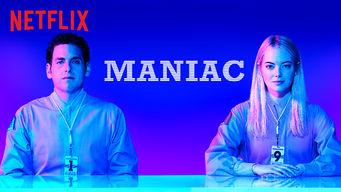Maniac, the new Netflix original series has finally premiered starring Emma Stone and Jonah Hill, and it did not disappoint.
This show takes place in New York city, time period unknown.There is fashion resembling that of the 1980’s, yet there are also “bots” casually strolling down the street as if it were a future series maintaining a mystery that keeps the audience intrigued to try and figure out what kind of society this is.
The audience is first presented with lead actress Emma Stone as Annie; a closed off, bitter, lonely, young woman. Appearing homeless in the opening scene, Stone’s character immediately exhibits law breaking habits to get by in the rough world that surrounds her. As the episode goes on it is clear there is more to her story, lower class status and brutal actions. She gives off a vibe that she makes things harder on herself than they have to be because she doesn’t trust anyone in the environment around her.
We are soon introduced to Owen, played by male lead Jonah Hill. He seems to struggle with schizophrenia, which keeps him in his own little world. He lies about taking medication, but it is evident in this episode he is not. Like Annie, he is lower class, with more to his story. He loses his job for what appears to be no reason, a surface excuse for an obviously deeper message of not really fitting into the office anyways, so no one would care if he was gone.
The plot on Owen’s side of poverty deepens as we are introduced to his family at a dinner party in their home. His family is extremely wealthy; their house, attire and attitude reflect typical New York upper-class stereotypes. The stark difference between him and his family keeps the audience engaged as they wonder what happened to cause such an estrangement.
Owen’s schizophrenia engages the audience over the course of the pilot because we can’t really tell if he is “crazy” or not. He clearly sees people that are not there, but this phenomenon that can’t be explained occurs, like seeing Annie’s face everywhere throughout the episode before they even meet.
A common theme of the episode is that he believes something is going on in this world and that he is “the chosen one” to save the world from some kind of destruction no one understands but him. Annie and Owen meet towards the end of the episode because they have both agreed to be testers for a medical trial. Owen is drawn to believe that Annie is the partner he has been waiting for, and it is she who is going to give him the directions on how to complete his mission.
Director Cary Joji Fukunaga does a good job of creating the sense that these testers are the evil that Annie and Owen need to combat. These doctors are beyond strange, yield signs of corruption, and make multiple allusions to subjects tested gone wrong in the past.
The recognizable lead characters pull the audience in on the surface that sets the show up for the audience to uncover deeper meaning of themes about humanity and society. Fukunaga plays with the idea of the rich doing shady things to keep the status quo, and the poor choosing poverty over conforming. The theme of necessity for human connection and how society tampers with that also surfaces as the two characters are completely alienated for completely different reasons that we can’t entirely understand just from this episode. The audience is driven towards resolution when engaging in the story. The pilot is extremely clever in it’s set up of incorporating all of these elements to keep viewers wanting to engage from beginning to end.
Christopher Hooten from Independent calls it “The most enticing TV plot in quite some time.”
Overall this series yields fascinating, twisted, and impressive.



































